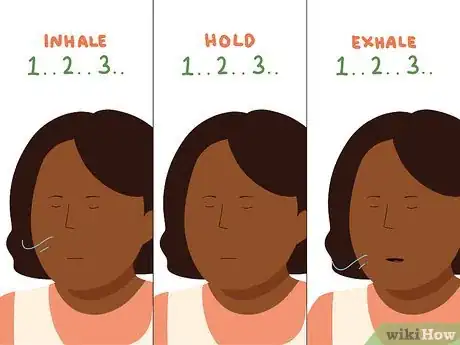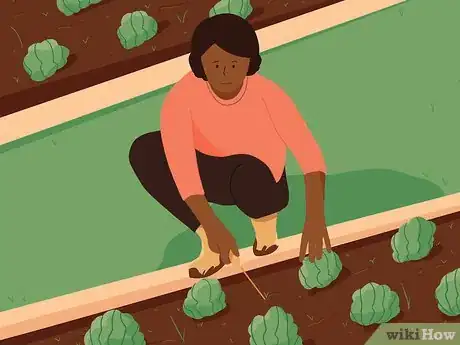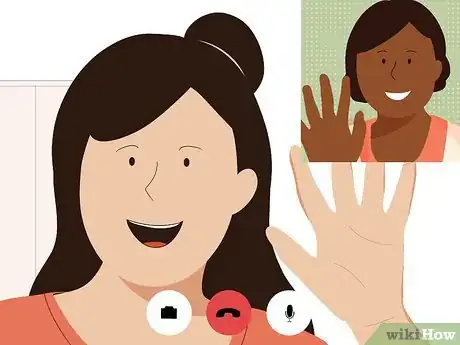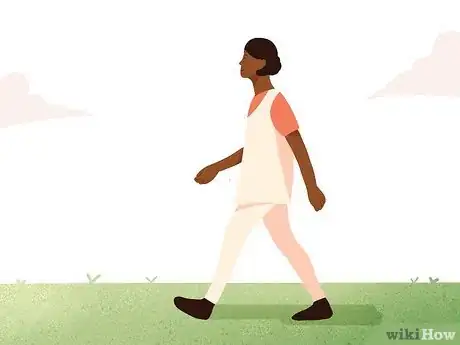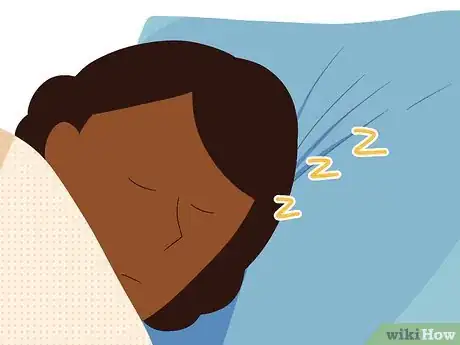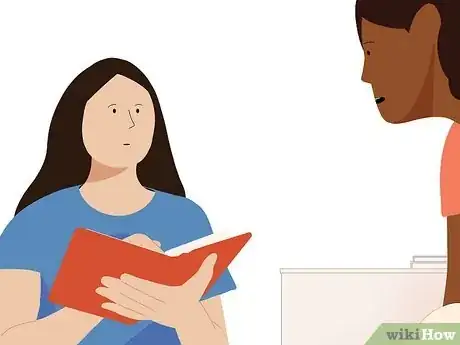This article was co-authored by Nicolette Tura, MA and by wikiHow staff writer, Amy Bobinger. Nicolette Tura is an Authentic Living Expert who operated her own wellness business for more than ten years in the San Francisco Bay Area. Nicolette is a 500-hour Registered Yoga Teacher with a Psychology & Mindfulness Major, a National Academy of Sports Medicine (NASM) certified Corrective Exercise Specialist, and is an expert in authentic living. She holds a BA in Sociology from the University of California, Berkeley and got her master's degree in Sociology from SJSU. She constantly draws from her own wounds and challenges; with her training in the healing arts and sociology, she offers potent content, powerful meditations, and game-changing seminars on inspiring elevation on a personal and corporate level.
There are 21 references cited in this article, which can be found at the bottom of the page.
This article has been viewed 66,337 times.
When you're feeling down, it can be really hard to feel like things are ever going to get better—but they will! Everybody gets the blues sometimes, so don't be too hard on yourself for feeling sad, angry, lonely, or depressed. Whether you're dealing with a momentary funk or your feelings are persisting long-term, we've gathered a list of a few time-tested tricks that can help you change the momentum and start feeling better. Taking control of your own state of mind can be tough, but you can do it!
Steps
Expert Q&A
Did you know you can get expert answers for this article?
Unlock expert answers by supporting wikiHow
-
QuestionHow do you lift your mood?
 Nicolette Tura, MANicolette Tura is an Authentic Living Expert who operated her own wellness business for more than ten years in the San Francisco Bay Area. Nicolette is a 500-hour Registered Yoga Teacher with a Psychology & Mindfulness Major, a National Academy of Sports Medicine (NASM) certified Corrective Exercise Specialist, and is an expert in authentic living. She holds a BA in Sociology from the University of California, Berkeley and got her master's degree in Sociology from SJSU. She constantly draws from her own wounds and challenges; with her training in the healing arts and sociology, she offers potent content, powerful meditations, and game-changing seminars on inspiring elevation on a personal and corporate level.
Nicolette Tura, MANicolette Tura is an Authentic Living Expert who operated her own wellness business for more than ten years in the San Francisco Bay Area. Nicolette is a 500-hour Registered Yoga Teacher with a Psychology & Mindfulness Major, a National Academy of Sports Medicine (NASM) certified Corrective Exercise Specialist, and is an expert in authentic living. She holds a BA in Sociology from the University of California, Berkeley and got her master's degree in Sociology from SJSU. She constantly draws from her own wounds and challenges; with her training in the healing arts and sociology, she offers potent content, powerful meditations, and game-changing seminars on inspiring elevation on a personal and corporate level.
Authentic Living Expert
-
QuestionHow do you become more confident?
 Nicolette Tura, MANicolette Tura is an Authentic Living Expert who operated her own wellness business for more than ten years in the San Francisco Bay Area. Nicolette is a 500-hour Registered Yoga Teacher with a Psychology & Mindfulness Major, a National Academy of Sports Medicine (NASM) certified Corrective Exercise Specialist, and is an expert in authentic living. She holds a BA in Sociology from the University of California, Berkeley and got her master's degree in Sociology from SJSU. She constantly draws from her own wounds and challenges; with her training in the healing arts and sociology, she offers potent content, powerful meditations, and game-changing seminars on inspiring elevation on a personal and corporate level.
Nicolette Tura, MANicolette Tura is an Authentic Living Expert who operated her own wellness business for more than ten years in the San Francisco Bay Area. Nicolette is a 500-hour Registered Yoga Teacher with a Psychology & Mindfulness Major, a National Academy of Sports Medicine (NASM) certified Corrective Exercise Specialist, and is an expert in authentic living. She holds a BA in Sociology from the University of California, Berkeley and got her master's degree in Sociology from SJSU. She constantly draws from her own wounds and challenges; with her training in the healing arts and sociology, she offers potent content, powerful meditations, and game-changing seminars on inspiring elevation on a personal and corporate level.
Authentic Living Expert
-
QuestionHow can you feel loved?
 Nicolette Tura, MANicolette Tura is an Authentic Living Expert who operated her own wellness business for more than ten years in the San Francisco Bay Area. Nicolette is a 500-hour Registered Yoga Teacher with a Psychology & Mindfulness Major, a National Academy of Sports Medicine (NASM) certified Corrective Exercise Specialist, and is an expert in authentic living. She holds a BA in Sociology from the University of California, Berkeley and got her master's degree in Sociology from SJSU. She constantly draws from her own wounds and challenges; with her training in the healing arts and sociology, she offers potent content, powerful meditations, and game-changing seminars on inspiring elevation on a personal and corporate level.
Nicolette Tura, MANicolette Tura is an Authentic Living Expert who operated her own wellness business for more than ten years in the San Francisco Bay Area. Nicolette is a 500-hour Registered Yoga Teacher with a Psychology & Mindfulness Major, a National Academy of Sports Medicine (NASM) certified Corrective Exercise Specialist, and is an expert in authentic living. She holds a BA in Sociology from the University of California, Berkeley and got her master's degree in Sociology from SJSU. She constantly draws from her own wounds and challenges; with her training in the healing arts and sociology, she offers potent content, powerful meditations, and game-changing seminars on inspiring elevation on a personal and corporate level.
Authentic Living Expert Love your body and surround yourself with people that you can be yourself around. If anyone makes you feel bad about yourself, I would really question the relationship or tell them how you feel. Really try to soak yourself up with TV shows, books, and anything else that makes you feel better about yourself. Try to focus on the positive and being grateful for what you have, even when difficulties in life come up.
Love your body and surround yourself with people that you can be yourself around. If anyone makes you feel bad about yourself, I would really question the relationship or tell them how you feel. Really try to soak yourself up with TV shows, books, and anything else that makes you feel better about yourself. Try to focus on the positive and being grateful for what you have, even when difficulties in life come up.
Warnings
- If you're experiencing persistent feelings of hopelessness, anger, or emptiness, among other symptoms, you could have depression.[32] Depression is a legitimate health concern and may require treatment beyond the advice provided in this article.⧼thumbs_response⧽
- Avoid self-medicating with alcohol or drugs—these will just make it harder to cope with your feelings in the long run.[33]⧼thumbs_response⧽
References
- ↑ https://www.psychologytoday.com/us/blog/evolution-the-self/201610/emotionally-upset-20-ways-defeat-negative-feelings
- ↑ https://www.psychologytoday.com/us/blog/evolution-the-self/201610/emotionally-upset-20-ways-defeat-negative-feelings
- ↑ Nicolette Tura, MA. Authentic Living Expert. Expert Interview. 23 January 2020.
- ↑ https://www.nhs.uk/conditions/stress-anxiety-depression/feel-better-and-happy/
- ↑ https://www.mayoclinic.org/healthy-lifestyle/adult-health/in-depth/self-esteem/art-20045374
- ↑ Nicolette Tura, MA. Authentic Living Expert. Expert Interview. 23 January 2020.
- ↑ https://www.health.harvard.edu/mind-and-mood/sour-mood-getting-you-down-get-back-to-nature
- ↑ https://www.psychologytoday.com/us/blog/open-gently/201707/if-sun-makes-you-happier-think-about-your-vitamin-d-level
- ↑ https://www.mayoclinic.org/healthy-lifestyle/stress-management/in-depth/stress-relief/art-20044456
- ↑ https://www.smithsonianmag.com/smart-news/feeling-down-scientists-say-cooking-and-baking-may-help-you-feel-better-180961223/
- ↑ https://www.weforum.org/agenda/2017/07/feeling-down-heres-some-advice-on-putting-the-smile-back-on-your-face/
- ↑ https://www.helpguide.org/articles/depression/coping-with-depression.htm
- ↑ https://www.nhs.uk/conditions/stress-anxiety-depression/feel-better-and-happy/
- ↑ https://www.mayoclinic.org/healthy-lifestyle/adult-health/in-depth/self-esteem/art-20045374
- ↑ Nicolette Tura, MA. Authentic Living Expert. Expert Interview. 23 January 2020.
- ↑ Nicolette Tura, MA. Authentic Living Expert. Expert Interview. 23 January 2020.
- ↑ https://www.inc.com/lolly-daskal/12-remarkable-quick-tricks-to-help-you-feel-better-instantly.html
- ↑ https://www.nhs.uk/conditions/stress-anxiety-depression/feel-better-and-happy/
- ↑ https://www.psychologytoday.com/us/blog/schlepping-through-heartbreak/201703/21-simple-things-you-can-do-feel-better-right-now
- ↑ https://www.helpguide.org/articles/depression/coping-with-depression.htm
- ↑ Nicolette Tura, MA. Authentic Living Expert. Expert Interview. 23 January 2020.
- ↑ https://www.helpguide.org/articles/depression/coping-with-depression.htm
- ↑ https://www.mayoclinic.org /healthy-lifestyle/adult-health/in-depth/self-esteem/art-20045374
- ↑ https://www.psychologytoday.com/us/blog/schlepping-through-heartbreak/201703/21-simple-things-you-can-do-feel-better-right-now
- ↑ https://pubmed.ncbi.nlm.nih.gov/11515738/
- ↑ https://www.nhs.uk/conditions/stress-anxiety-depression/feel-better-and-happy/
- ↑ https://www.nhs.uk/conditions/stress-anxiety-depression/feel-better-and-happy/
- ↑ https://www.helpguide.org/articles/depression/coping-with-depression.htm
- ↑ https://www.psychiatrictimes.com/view/dark-chocolate-depression
- ↑ https://www.nhs.uk/live-well/sleep-and-tiredness/how-to-get-to-sleep/
- ↑ https://www.helpguide.org/articles/depression/coping-with-depression.htm
- ↑ https://www.mayoclinic.org/diseases-conditions/depression/symptoms-causes/syc-20356007
- ↑ https://www.nhs.uk/conditions/stress-anxiety-depression/feel-better-and-happy/
About This Article
To feel better, call a loved one like a friend or family member so you can discuss your problem and get some advice. Loved ones often know us the best and can offer valuable insights or distractions. If that's not an option, go do a physical activity, like going for a walk in a nearby park or dancing. Physical activity can help boost endorphins and make you feel happier. Another way to feel better is to spend time doing something you are passionate about, like playing music, painting, or playing sports. To learn how to let go of negative thoughts, keep reading.
